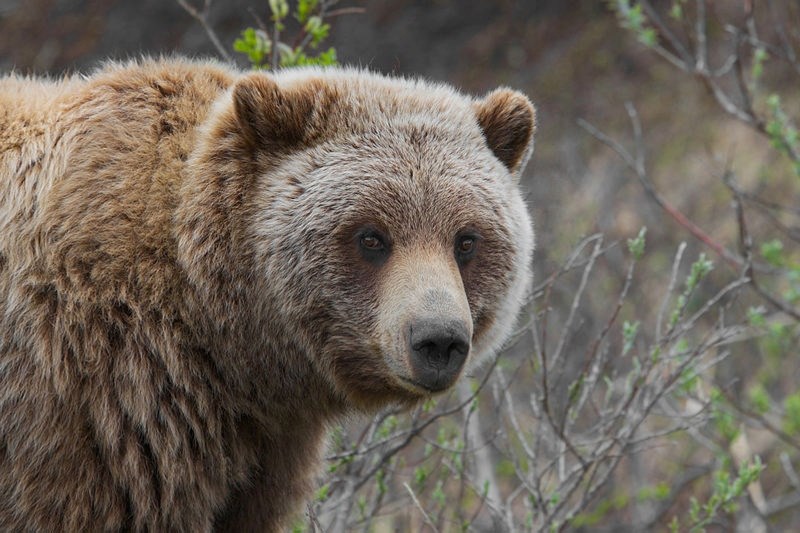The Cochrane Ecological Institute is calling on the province to change to rules around rescuing orphaned bear cubs after it was revealed two recently orphaned black bear clubs were left to fend for themselves in the wild.
Orphaned black bear cubs can only be admitted to approved rehabilitation facilities between January and July 1 every year, according to the Alberta Orphaned Black Bear Protocol released by Alberta Environment and Parks (AEP).
After July, AEP makes the decision to rehabilitate or euthanize the animals. The policy states cubs must be under one year old and not yet have denned the previous winter in order to be rehabilitated.
The Cochrane Ecological Institute’s Wildlife and Animal Care Technician Kat Phillips said the provincial rule is what prohibited them from attempting to rescue to orphaned black bear cubs after their mother was struck by a vehicle and killed west of town last week.
Phillips said the wildlife officers who responded to the call about the two cubs on the road last week determined that they were not injured, and were old enough and big enough to survive on their own.
“This is not on the officers; it’s on the policy they have to abide by,” she said.
“They said these cubs did not require rehabilitation and that they didn’t want the cubs to become habituated and have future negative interactions with Albertans, so rehab is not necessary. So they believe very clearly, and they’ve been reiterating to us that they don’t need help,” she said.
“Honestly, we disagree with that.”
According to Phillips the approach goes against the biology of black bears as mother black bears lactate for 14 to 17 months after giving birth.
If left to fend for themselves, Phillips believes these cubs will starve to death or get hunted by predators.
“There’s not a lot of forage out there – they have to come to urbanized areas,” she said. “So following the protocol is actually encouraging the bears to become habituated to people because they have to find food.”
“And they don’t have a mom to tell them what’s the right thing to do,” she added.
Phillips said the policy must change.
“We would reframe the policy, and look at the biology of bears, what they need to grow and be successful, (and) how can we all work together as rehabbers and Fish and Wildlife to do it for the bears,” she said.
Phillips said Cochranites should be alert for visits from hungry bears in the coming weeks, and should always call Fish and Wildlife whenever they see them in or near their yards.
The CEI is funded through charitable donations and the occasional grant – there is no provincial funding. For more information on their work go to ceiwildlife.org.
In other bear related news, the Biosphere Institute of the Bow Valley, a non-profit wildlife group based in Canmore, runs an educational program called WildSmart that issues a monthly Bear Report. Bears continue to be in the news as they’ve been seen regularly in residential areas throughout the Bow Valley, as well as in Kananaskis Country.
“They are actively searching for food for the next six weeks to fatten up for their winter hibernation,” the report states.
It is one of the two most dangerous times of year for human-bear conflict – spring and fall, when they’re hungriest.
Doug Inglis and Jenny Gusse were attacked and killed in their tent by a grizzly in Banff National Park a couple of weeks ago.
A guide with 13 people was followed by two grizzlies for some time in Banff recently.
A black bear was captured and euthanized in the Cougar Creek area after repeatedly feeding in fruit trees.
And as he was getting ready to hike at Elbow Lake in Peter Lougheed Provincial Park on Oct. 2, a man captured video of a grizzly chasing bighorn sheep.
As of Oct. 5 both black and grizzly bears continue to be active in Kananaskis Country resulting in two bear warnings and one bear closure to be put in place this past week: a bear warning at the construction site on Highway 40, east of Kananaskis Golf Course due to a surprise encounter with a grizzly bear; a bear warning at West Bragg Creek and Surrounding Areas due to a surprise encounter with a grizzly bear that resulted in a bluff charge; and a bear closure at Moose Mountain biking trails due to a black bear feeding on carcass.
WildSmart advises Bow Valley residents to be aware that attractants such as fruit trees pose a safety risk to people and the survival of bears.
In addition to removing fruit from yards, they recommend securing and removing other wildlife attractants around the home such as taking down birdfeeders, storing all pet food inside, cleaning barbecues and ensuring the garbage is secured.
If bears try these food sources they learn that human-inhabited areas provide easy meals, meaning they're more likely to stick around. This can become a public safety issue as bears can get protective of food sources, leading to conflicts between bears and humans, with bears normally paying the price by getting relocated or destroyed.
For more information go to keepwildlifealive.ca.
Human-wildlife interactions, not just with bears, are always fraught with dangers and risks, and those two orphaned bear cubs are hardly the only thing on the Cochrane Ecological Institute’s mind in recent weeks.
They also currently have a moose calf, two deer fawns, a couple of “educational” animals, (including a skunk) and a Swainson’s Hawk they’ve named Scott, after one of the firemen who saved it from the grassfire it was trapped by near town in August.
Scott’s foot and wing were fire damaged; and although he’s eating well, he’s not quite ready for release.
“He’s showing raptor behaviour, but still trying to figure it out. He’s a little clumsy right now,” she said with a laugh.




